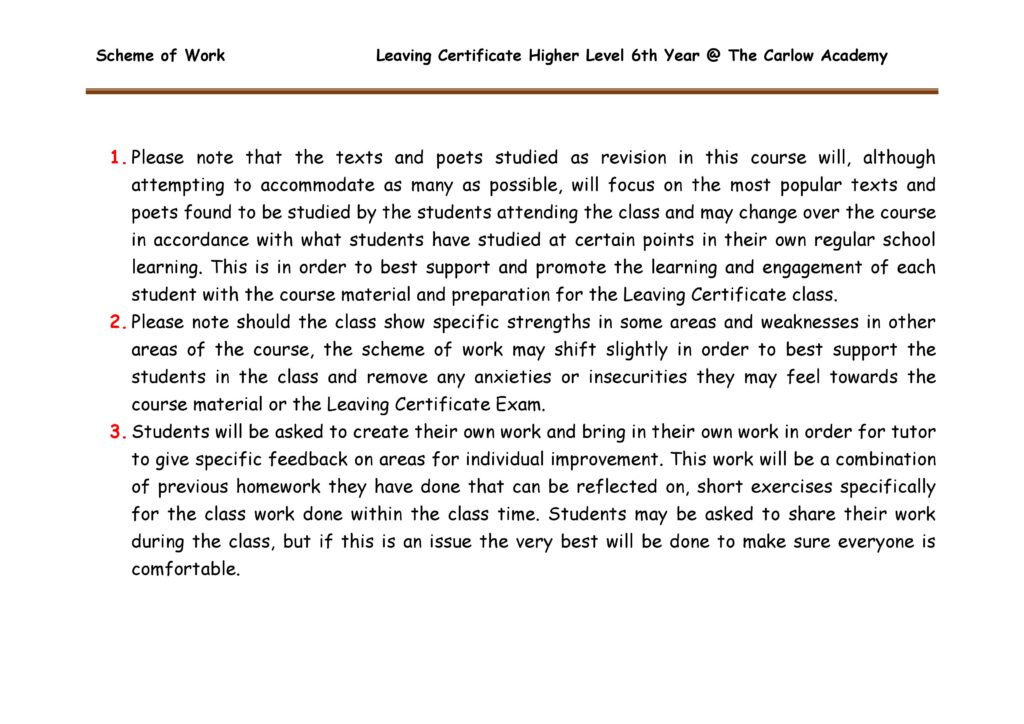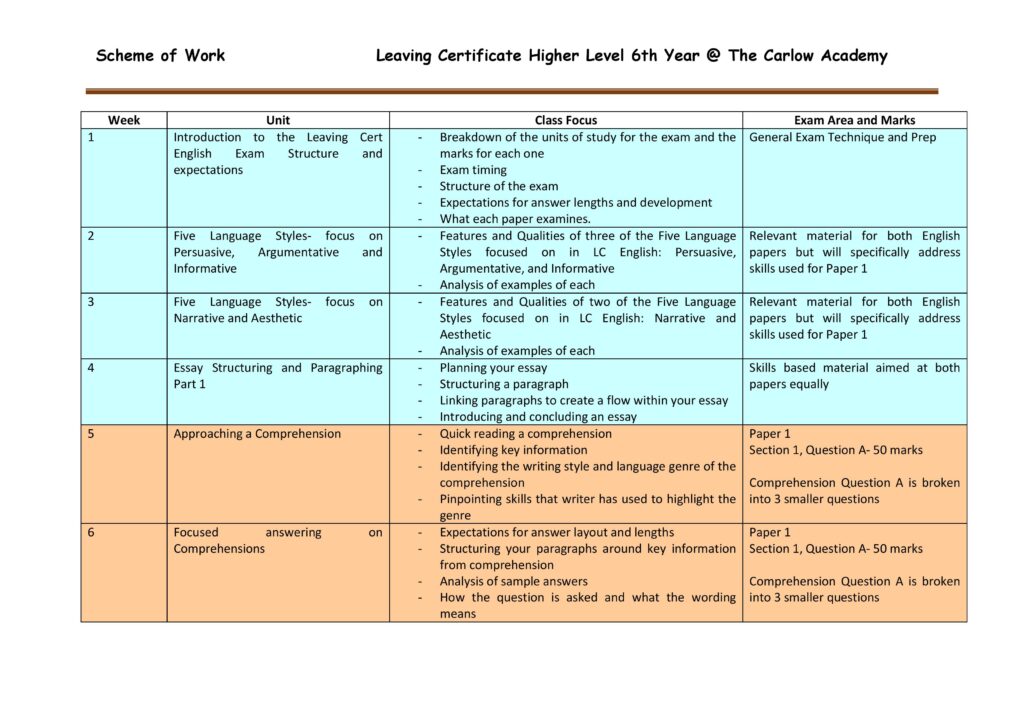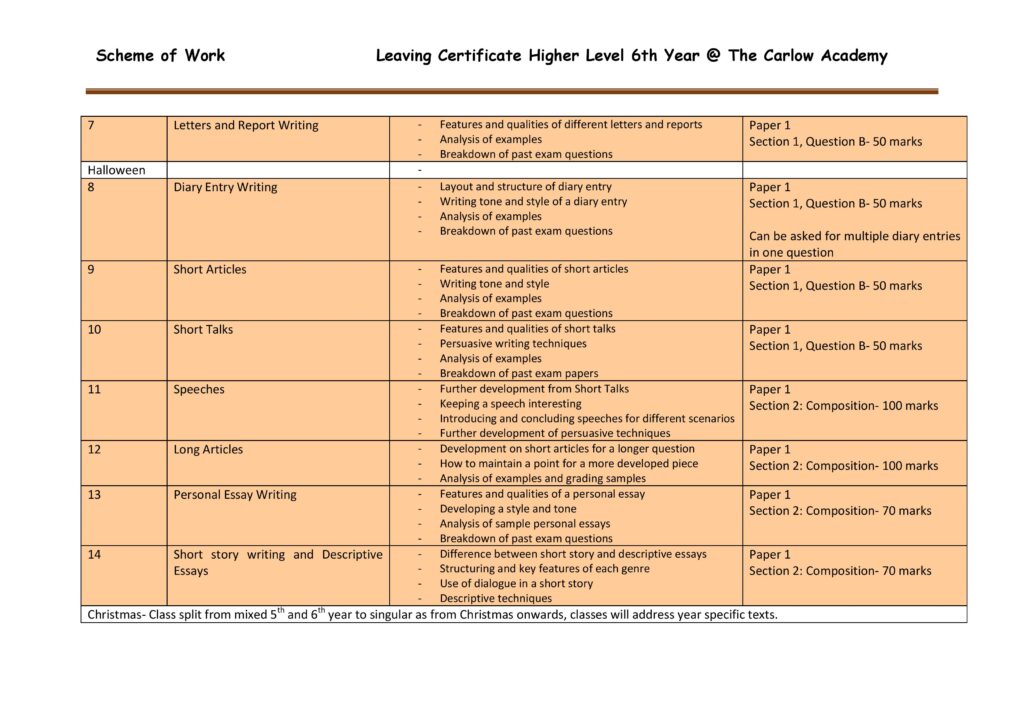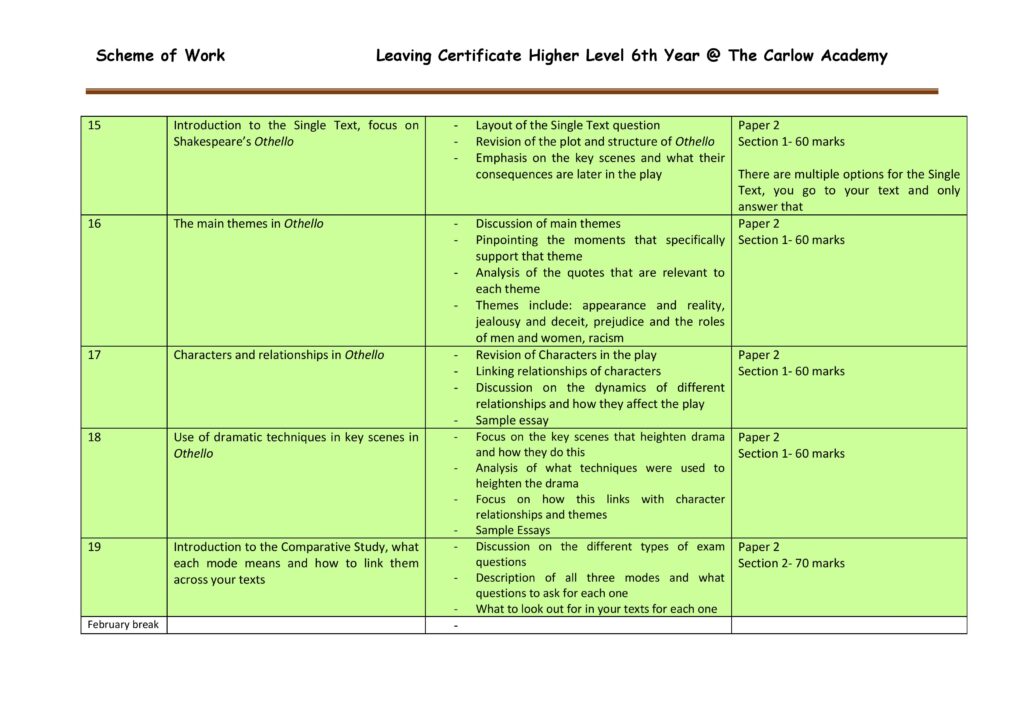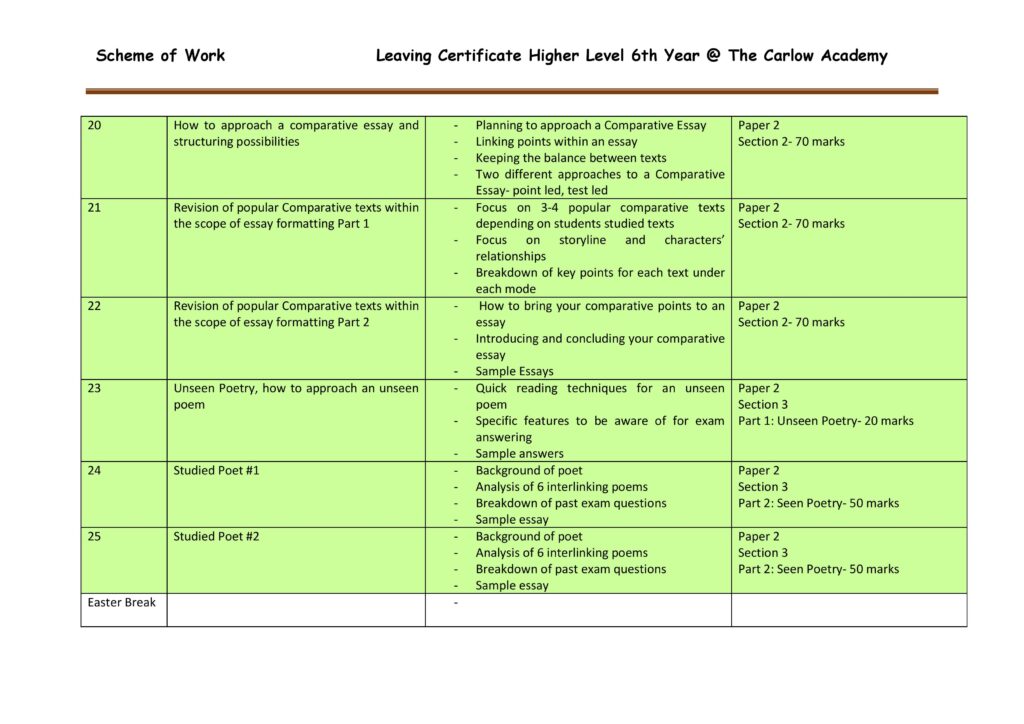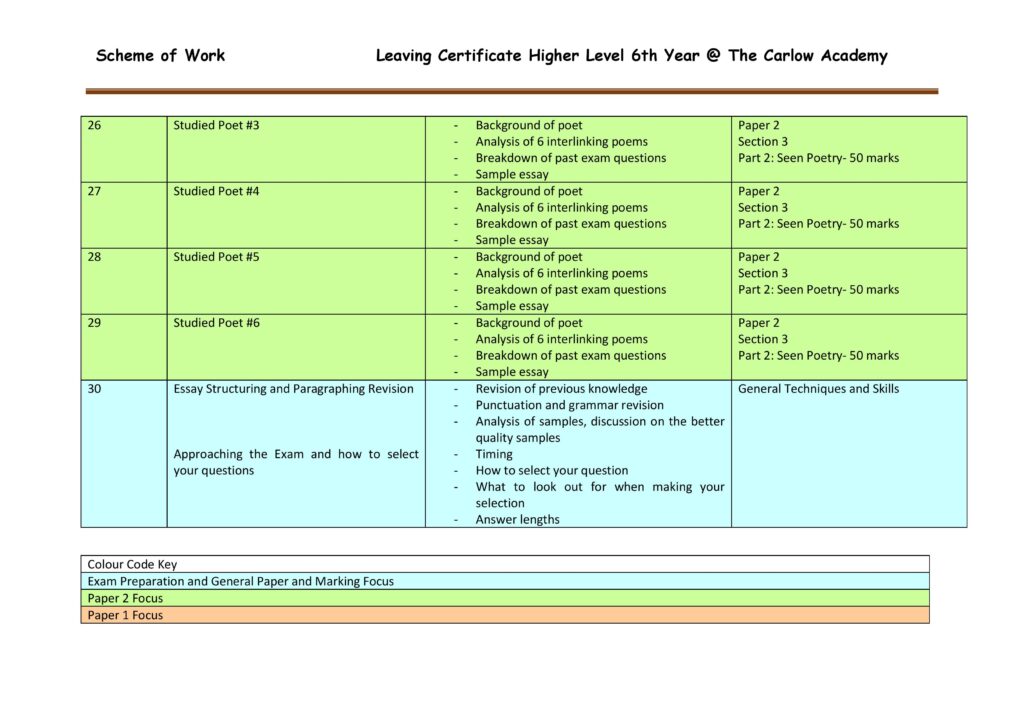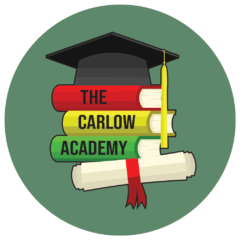Scheme of Work for the Junior Cycle Higher Level English Weekly Grinds Sessions [for 2nd & 3rd year students]
**Both CBA1 and CBA2 are assessed at a common level for all students based on a ‘Features of Quality Framework’ grading system**
This course is designed to introduce students to the requirements of the new Junior Cycle English course. Classes prioritise the three strands of learning outcomes on the new English Junior Cycle syllabus: Oral Language, Reading and Writing.
- Class Based Assessments (CBA1 & CBA2)
Oratory skills, research, preparation, writing speeches, debates and presentations (CBA1).
Reflection and personal writing (CBA2). - Portfolio
Writing and how students can improve in this area.
Syntax, vocabulary, grammar, tone, register & structure. - Examination preparation
Time management.
Planning.
Structuring answers.
General exam tips.
These classes are designed to thoroughly prepare students for the Junior Cycle Higher Level English exam.
Throughout the year students are encouraged to participate, think, practise, and feel comfortable voicing concerns or confusion in a structured and positive atmosphere. The fundamentals of English – spelling, grammar, syntax and punctuation – are emphasised at all times. At no point will any student be encouraged to rote learn. The Junior Cycle English curriculum has a strong and correct focus on skills, and these are the skills around which these classes are built.
The new final Junior Cycle exam now consists of only ONE PAPER for both Higher & Ordinary Level exams which is 2 hours in length. This 2 hour paper makes up 90% of the student’s final grade and the other 10% is made up of their Assessment Task (reflection task based on the learning outcomes assessed in CBA2) completed before the final exam in June not long after students submit their Classroom Based Assessment 2 project.
All classes aim to develop the skills needed to produce a young writer who understands how to produce structured, purposeful, articulate answers. Students receive model answers that deliberately vary in quality and are encouraged to develop the reflective mindset that is so important to Junior Cycle English.
The curriculum requires students to study particular texts from a list of prescribed material. Comprehensive notes, guidelines and model answers are provided across a range of these texts, specifically including: Studied Drama; Studied Fiction; Studied Film; and Studied Poetry
Topics from:
- Structure
Sentence and paragraph building, with a focus on clear communication.
How to overcome the ‘I know what I want to say, but don’t know how to say it’ problem. - The characteristics of good storytelling
What makes good narrative writing?
How to apply these elements to the analysis of a text and to creative writing. - Introduction to Poetry
What to look for in a poem, in terms of style and theme?
Vocabulary that allows you to express a view of a given poem. - Drama and Fiction
All 2nd and 3rd Years will be required to study two novels and two plays in preparation for their Junior Cycle exam as they may be asked for a comparison. This class shows students what to look for when reading their text, and also highlights the important aspects of a text that should be prepared.
Please note the following important points:
**All students must bring their own everyday classroom materials + 1A4 manuscript notes copy**
**Unfortunately sharing of any equipment cannot be allowed due to the current health & safety guidelines so students must come prepared with their own materials**
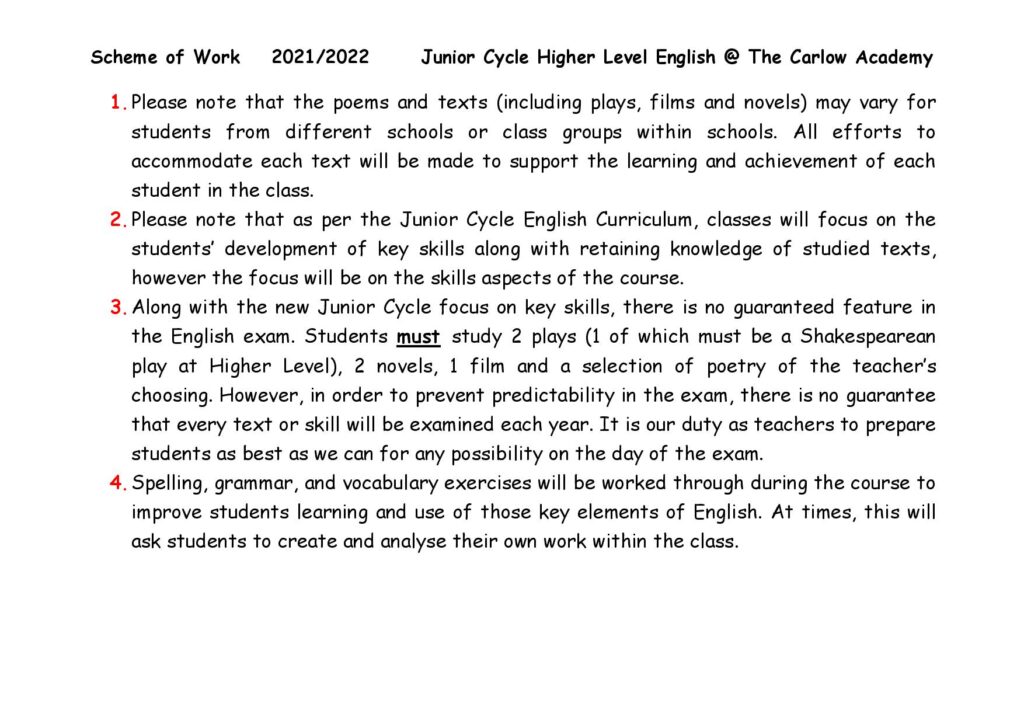
Finally, EXTRA NOTES will be published each week on Edmodo for students to be able to study supplement course material at their own leisure outside of our tuition sessions. We would ask all members to use these digital classrooms platforms on a weekly basis to maximise their overall grade.
Scheme of Work-Junior Cycle Higher Level English-[Revision Template]
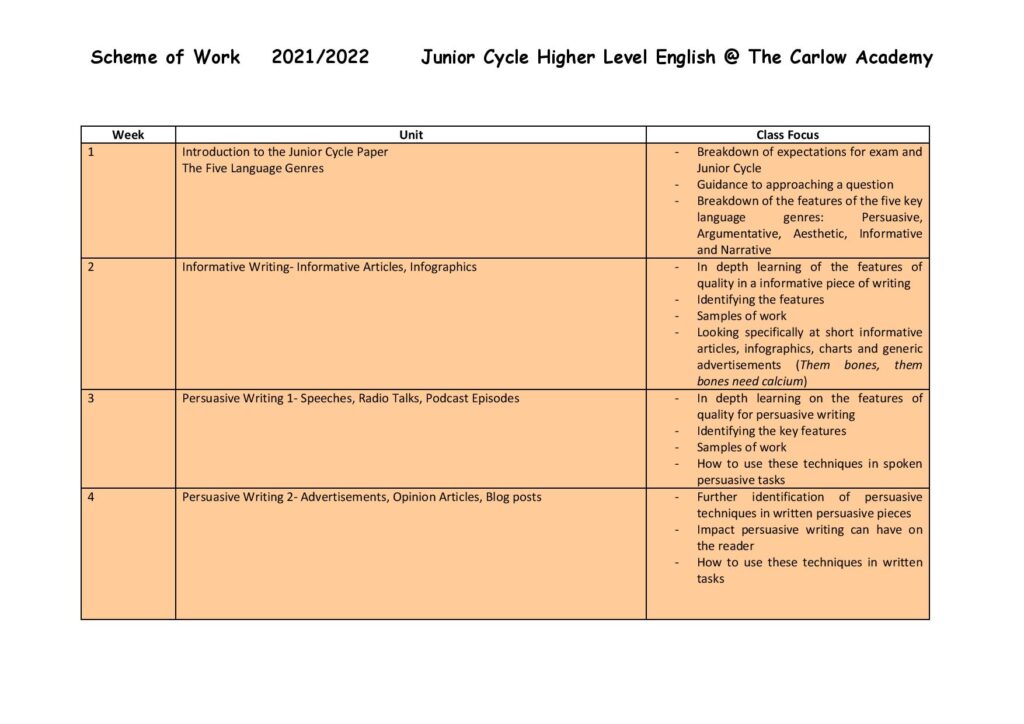
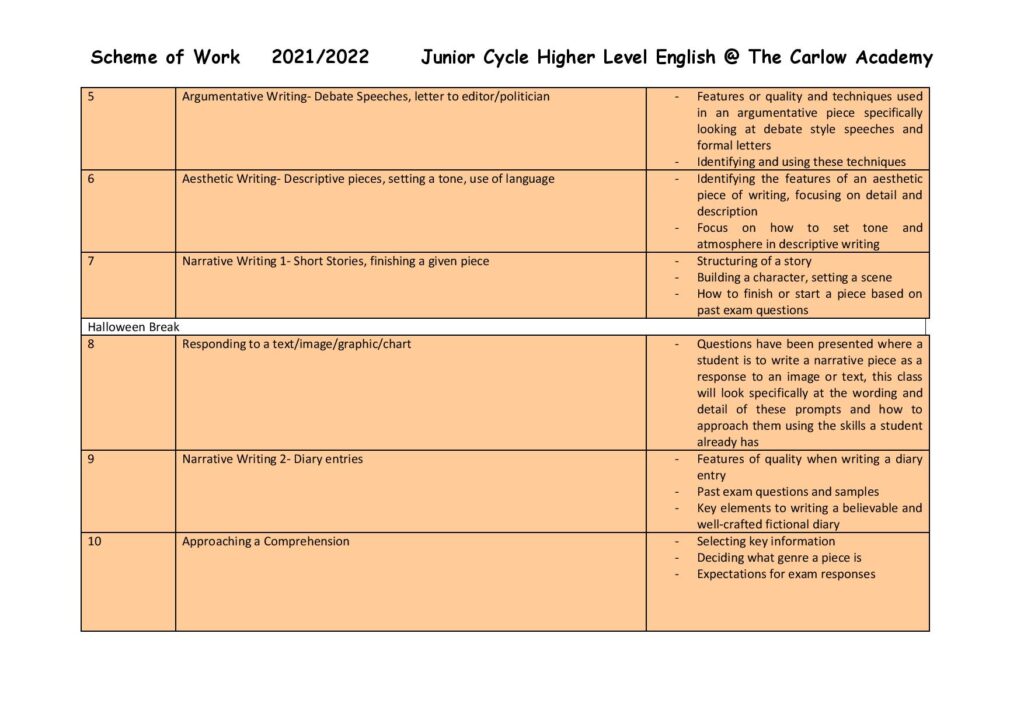
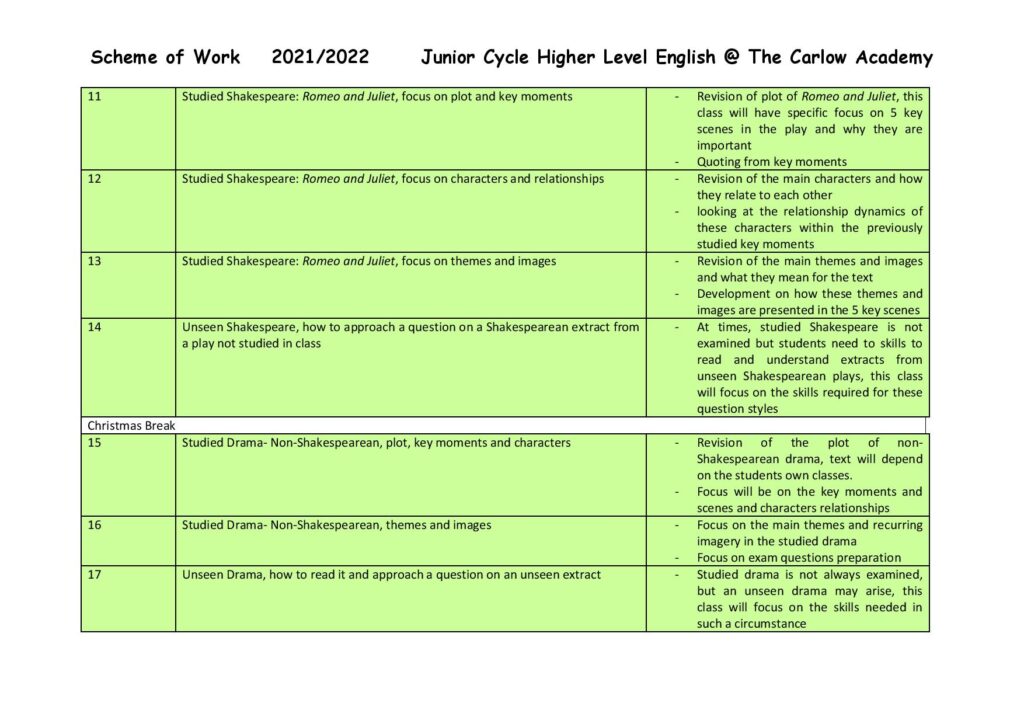
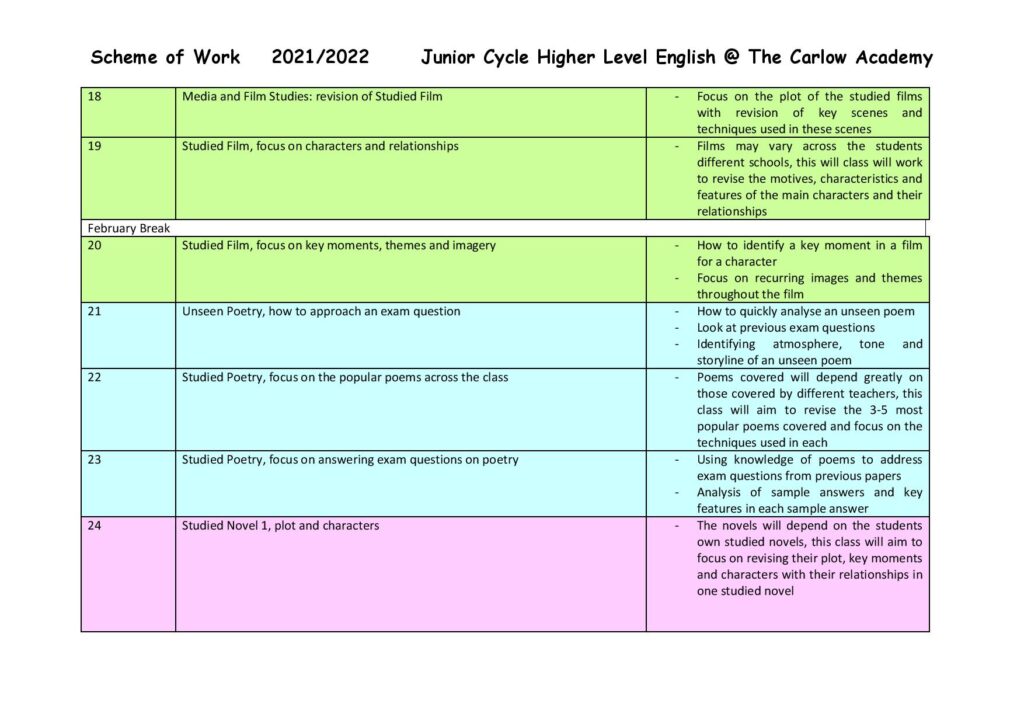
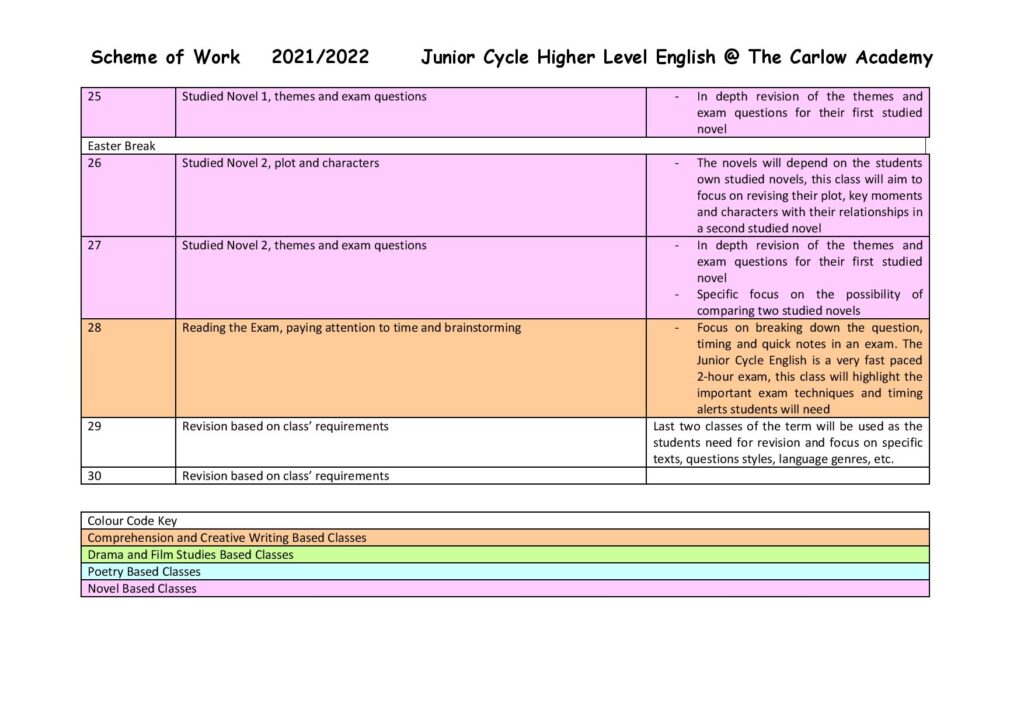
Scheme of Work for the Leaving Cert Higher Level English Weekly Grinds Sessions [for 5th year students ONLY]
Please note the following important points:
**All students must bring their own everyday classroom materials + 1A4 manuscript notes copy**
**Unfortunately sharing of any equipment cannot be allowed due to the current health & safety guidelines so students must come prepared with their own materials**
Finally, EXTRA NOTES will be published each week on Edmodo for students to be able to study supplement course material at their own leisure outside of our tuition sessions. We would ask all members to use these digital classrooms platforms on a weekly basis to maximise their overall grade.
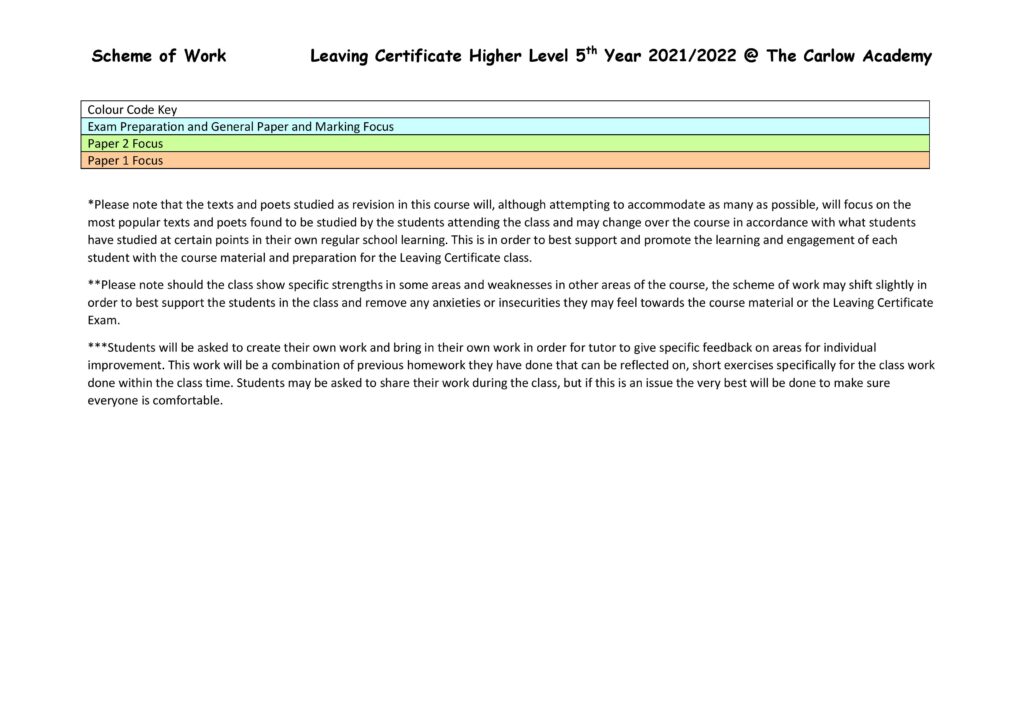
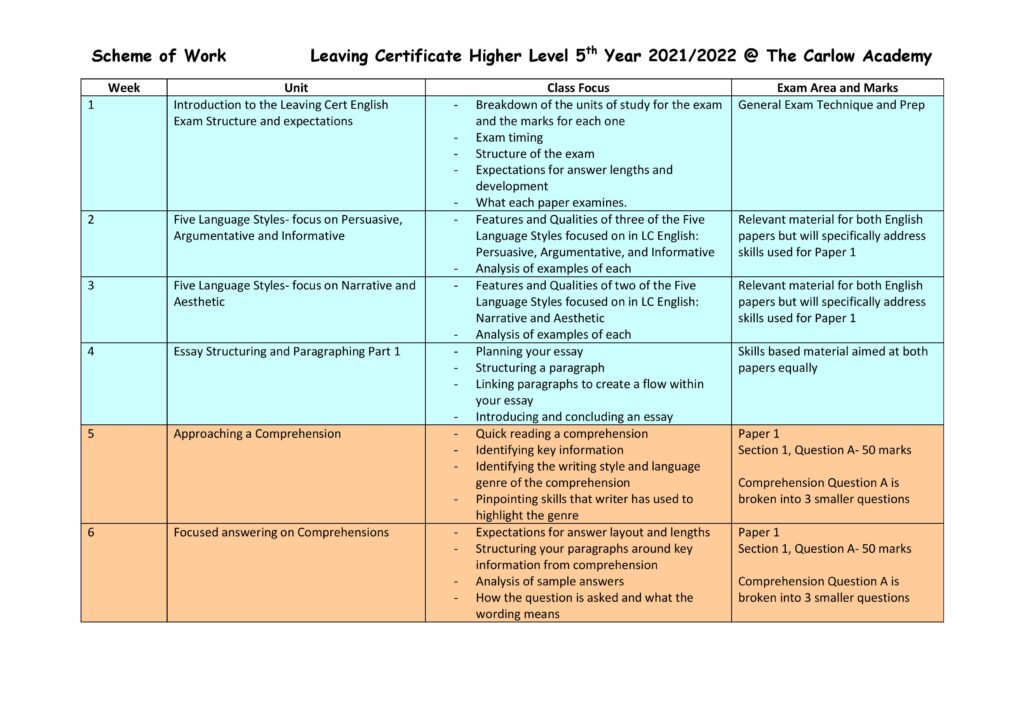
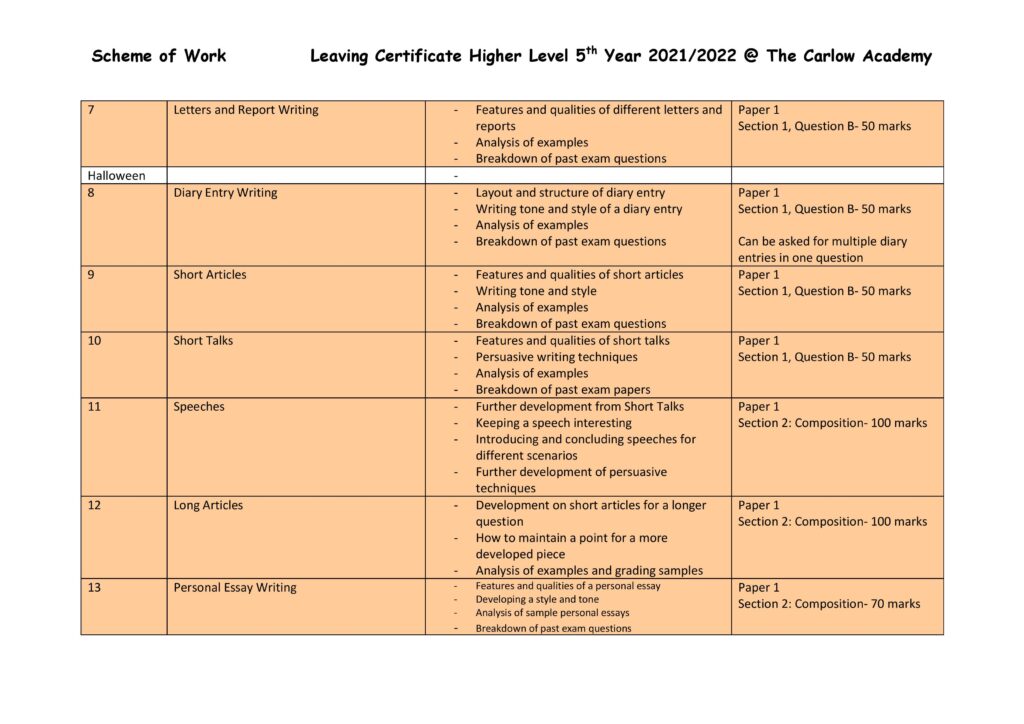
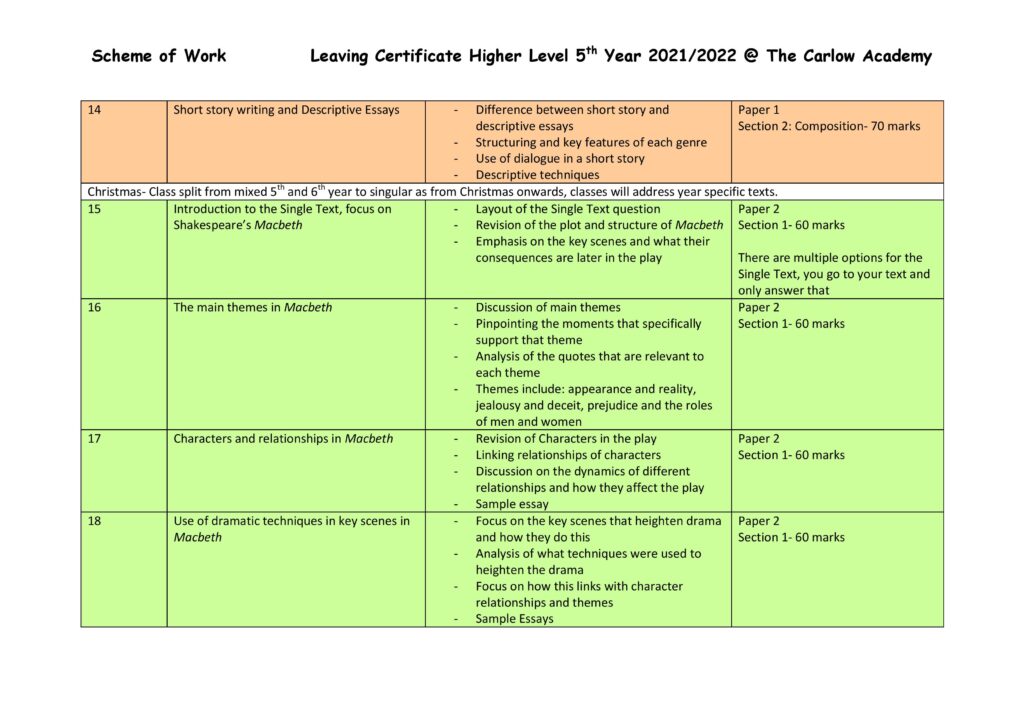
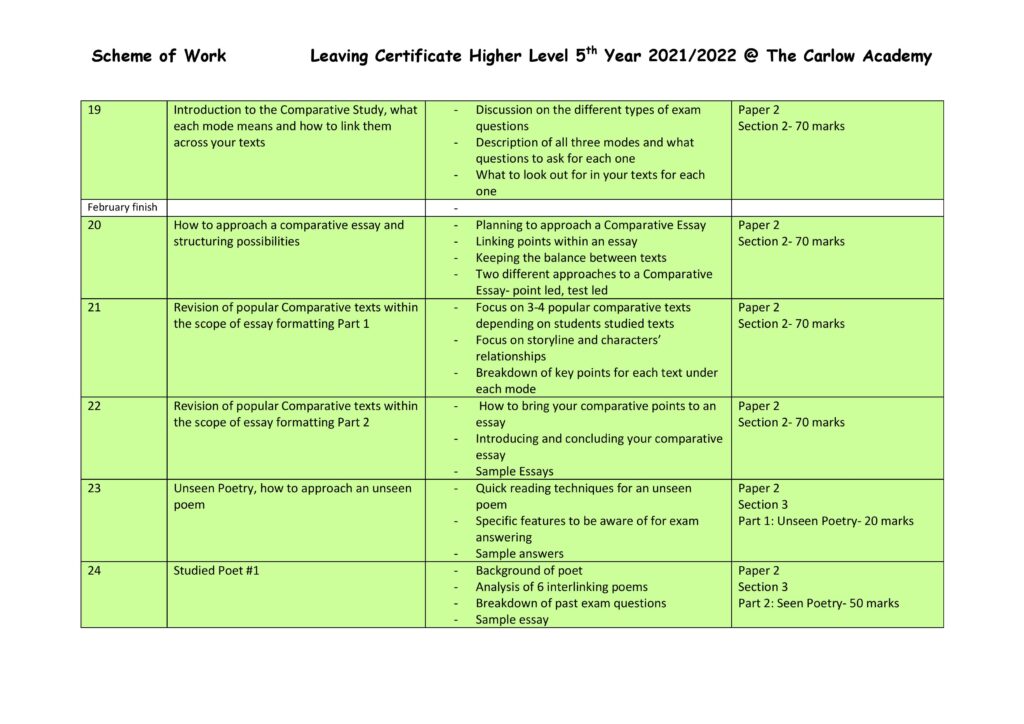
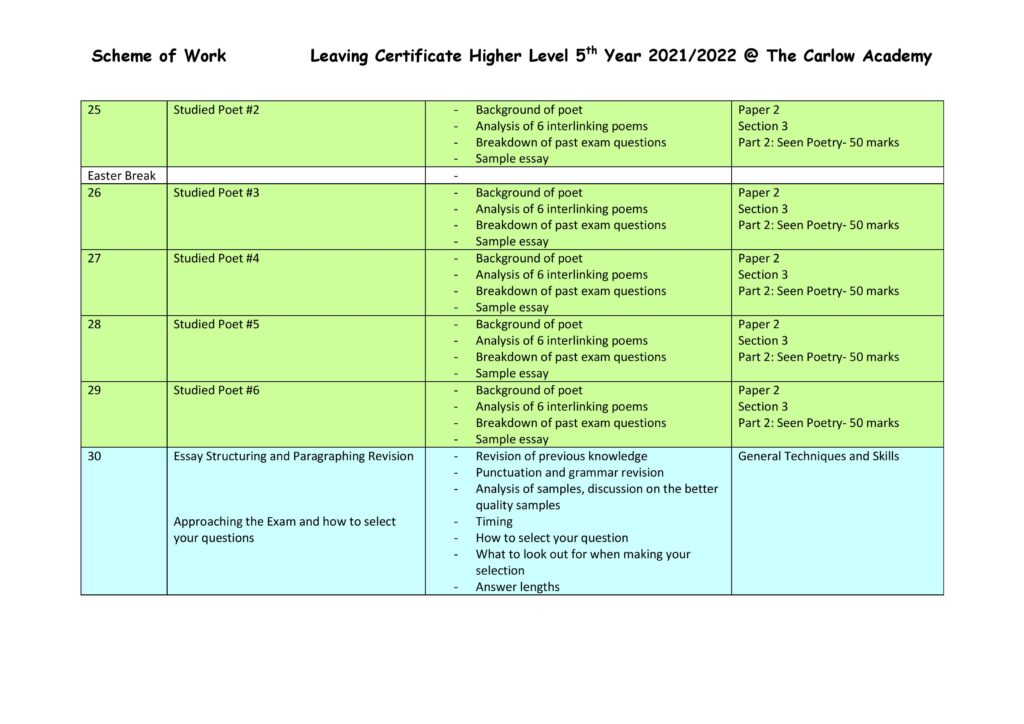
Scheme of Work for the Leaving Cert Higher Level English Weekly Grinds Sessions [for 6th year students ONLY]
This course is designed to help students attain the knowledge and skills required for success in the Leaving Certificate 2021/2022 Higher Level English curriculum. Requirements of both Paper 1 and Paper 2 will be covered throughout the course.
Paper 1 – Topics from:
- How to read texts & critically analyse them.
- How to write texts that are succinct and conform to specific exam requirements.
- Ongoing practice of these skills throughout the year.
Paper 2 – Topics from:
- Single Text
Comprehensive notes provided - Poetry
All poets prescribed for Leaving Cert 2022 will be explored during the course of the year. - Comparative
Analysis of the modes set for examination in 2022 – Theme or Issue, General Vision & Viewpoint and Cultural Context.
A selection of comparative texts will also be analysed in detail.
More topics from:
- Writing
How to identify key features of writing in the Language of Narration, the Language of Argument and the Language of Persuasion.
How to use this information to analyse Reading Comprehension passages.
How to use this information to structure and write compositions and functional writing (QB) creative writing exercises. - Central Text
Comprehensive notes provided on the Central Text dealt with in this class. - Comparative
Analysis of the modes set for examination in 2022 – Literary Genre, General Vision and Viewpoint and Cultural Context.
Notes and model answers provided on all sections. - Detailed notes also provided on:
Essay Writing.
Question A & B texts
On the Single Text.
Selection of poems from 6 poets.
The Unseen Poem.
The 3 Modes of comparison.
Structuring the comparative question.
Samples of effective comparative essay writing in each of the three modes of comparison. - Essay Question
Study of effective writing in different essay genres. - Comprehending
The (A) question: Examining features of writing style and comprehension skills. - Composing
The (B) question: Study of the skills needed for short composing tasks and the presentation of a point of view. - Shakespearean drama- Othello for 2022 and Macbeth for 2023
Key essays on themes and characters together with important quotations. - Poetry
Notes on the 6 poets with a minimum of 5 poems on each poet. Sample answers on each. - Comparative Study
A wide selection of Comparative texts with analysis of the 3 modes of comparison together with sample answers. - Skills to tackle Comprehension
How to approach the task.
How to maximize the confidence builder question.
Which question to choose/how to code the comprehension and link back to your answer. - How to handle Visual Imagery question
Elements of style – what to look for/ what to adopt?
Timing/ how much to write? - Functional Writing
Different genres of writing.
How to hone your skills.
Structure- IFCR.
How to cultivate your own voice.
How much to write.
How to maximize your grade. - The 100 marker-25% of your exam
Key elements of a great short story.
How to create an authentic short story.
What does a H1 Descriptive Essay look like?
Speech writing – the essential elements.
What option do I choose? - The Set Text checklist
The breakdown of the essential elements IFA high grade essay.
Sample H1 essays- what do they look like?
Timing/ revision tactics.
Quotes/ references- how much do I need to know? - Cracking the Comparative
Understanding that this is a mode based question.
What do I need to know about my texts?
How much detail do I need?
How to explore a key moment effectively.
The structure of the essay.
How much to write.
How to prepare. - Poetry task
How to tackle the Poetry essay- structure, timing, essential elements.
Connecting with the Unseen poem.
How much do I need to know per poet/ per poem?
Timing, poetic devices, connecting with the poet/ work.
Time management in the different sections of the examination papers will also be covered and students are encouraged to discuss any difficulties or issues encountered in Leaving Certificate Higher Level English with the teacher throughout the year.
Please note the following important points:
**All students must bring their own everyday classroom materials + 1A4 manuscript notes copy**
**Unfortunately sharing of any equipment cannot be allowed due to the current health & safety guidelines so students must come prepared with their own materials**
Finally, EXTRA NOTES will be published each week on Edmodo for students to be able to study supplement course material at their own leisure outside of our tuition sessions. We would ask all members to use these digital classrooms platforms on a weekly basis to maximise their overall grade.
Scheme of Work-Leaving Certificate Higher Level English [Revision Template]
